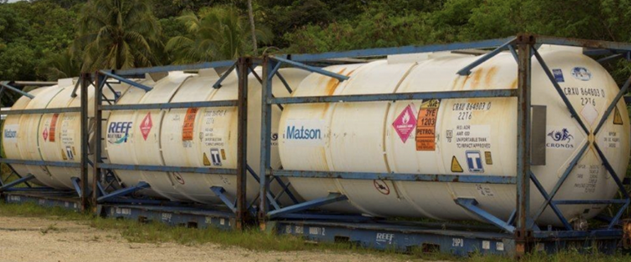
Why used oil processing technologies?

Photo Credit: Storage of used oil in Niue, SPREP
Used oils are considered dangerous for the environment and humanity. They pollute drinking water, food resources and local aquatic ecosystems such as rivers, lakes and ponds.
Furthermore, as used oils come from using lubricant oils and other hydraulic fluids, toxicity occurs from the range of compounds in oils, which means they need to be stored in a safe manner.
These issues surrounding used oil are especially relevant for Pacific Island Countries due to their limited access to resources for oil processing and disposal. The Sustainable Waste Actions in the Pacific (SWAP) project has highlighted used oil as a potentially recoverable waste stream and is working with their member nations, including Samoa, Solomon Islands, Tonga and Vanuatu, on the development of on-island management of used oil technologies.
Benefits of implementing used oil technologies:
Benefits of implementing used oil technologies can result in a range of positive sustainable benefits in terms of environmental, economic and operational.
1. Environmental-
- Prevent contamination to water sources and soil from inappropriate storage/disposal.
- Avoid emissions (e.g. dioxins and heavy metals) from open burning;
- Recycling conserves finite resources; and
- By producing lubricating oils from recycled base oils, one-third of the emissions are generated when compared to crude oil.
2. Economic-
- Requires only one litre of recycled base oil to generate 0.63 litres of new lubricating oil (compared to needing 42 litres of crude oil) ;
- Creates jobs and drives innovation.
- Decrease reliance on foreign oil supplies; and
- Produces saleable end products or electricity generation.
3. Operational-
- Recycled oil meets the same standards as virgin base oil;
- Provides revenue to support collection and storage systems;
- Decreases used oil stockpiles; and
- Decrease the need for used oil exports for processing
Ultimately, the core issues addressed will include the efficient management of used oil, heighten knowledge on potential health and environmental risks and allow authorities and stakeholders to contribute to minimising the impacts of ineffective used oil management.
READ MORE:
- https://library.sprep.org/sites/default/files/2022-05/Used-oil-management-options-report.pdf
- https://library.sprep.org/content/used-oil-management-summary-booklet
Note: This story has been developed with the support of the University of Newcastle (Australia) as part of a partnership between SWAP and the University through Work Integrated Learning. As such, the SWAP coordinator acknowledges all the students involved in this collaboration, including Mrs. Kayla Koulis for this article.
This document has been produced with the financial assistance of the AFD. The views expressed herein can in no way be taken to reflect the official opinion of the AFD.
